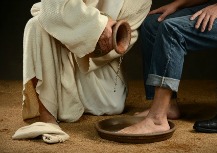Scripture
Job 40:6, 8 NLT
Then the LORD answered Job from the whirlwind…”Will you discredit my justice and condemn me just to prove you are right?”
Consider
Why is being right so important to us? How many times have we distanced ourselves from God and from other people because we couldn’t admit to being wrong or flawed?
Our fear of being wrong may be rooted in childhood shaming by parents, siblings, or others who attacked our self-worth when we showed ourselves to be less than perfect. This arrested fear of shaming carries into adult relationships and may compel us to distort facts and rationalize faulty judgments to avoid the horror of being exposed as weak or flawed. We may try to keep our faults hidden by pointing fingers at other people and making them wrong so we can be right. Proving our case becomes more important than understanding the full truth, fixing blame more urgent than reconciling differences.
Jesus tells the story of two men who went up to the temple to pray: a proud Pharisee and a humble tax collector. He warns his disciples not to be like the Pharisee, who prayed, “God, I thank you that I am not like other people—robbers, evildoers, adulterers—or even like this tax collector. I fast twice a week and give a tenth of all I get.”
The self-righteous person believes in self-rightness, that is, in exalting oneself to God’s level by thinking and behaving flawlessly. In such a mind frame, we believe that God owes us a place in heaven because we have been so good and careful. We gauge our worth by comparing ourselves to others and reckoning all the ways in which we are superior.
By contrast, Jesus teaches that in God’s kingdom it is the humble tax collector whom God counts as worthy. Standing apart from the self-righteous Pharisee, he can only beat his breast and pray, “God, have mercy on me, a sinner.”
The next time you are tempted to prove yourself right in a relationship, take a moment to examine your motives. Ask yourself these questions:
- Am I trying to prove my worth by demonstrating my superiority to this person?
- Do I need to be right, or am I open to changing my position?
- Is my being right more important to me than saving this relationship?
- How would it feel for me to be exposed as wrong or flawed and in need of this person’s forgiveness?
Pray
Heavenly Father, it is painful for me to admit my imperfections. I confess to the many times I have refused to reconcile with others because they refused to see things my way. I am ashamed to acknowledge how much I resemble that self-righteous Pharisee. Change my heart, Lord, to be like the humble tax collector, who recognized his need for your cover of righteousness and mercy.
Reflect
Luke 18:9-14; Romans 3:9-12
Ponder
How do I feel when I make a mistake that is witnessed by others? How do I treat others who make a mistake?








